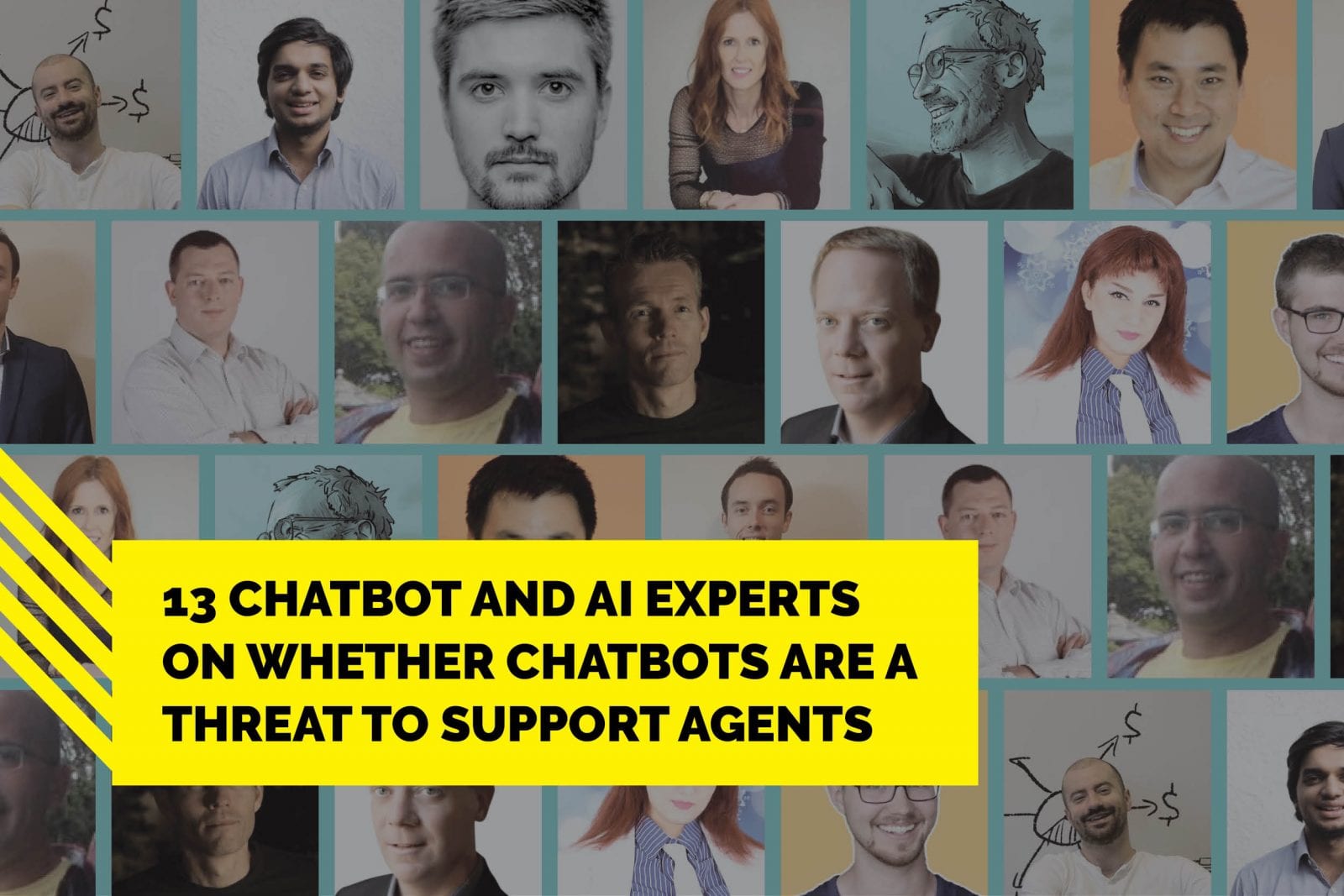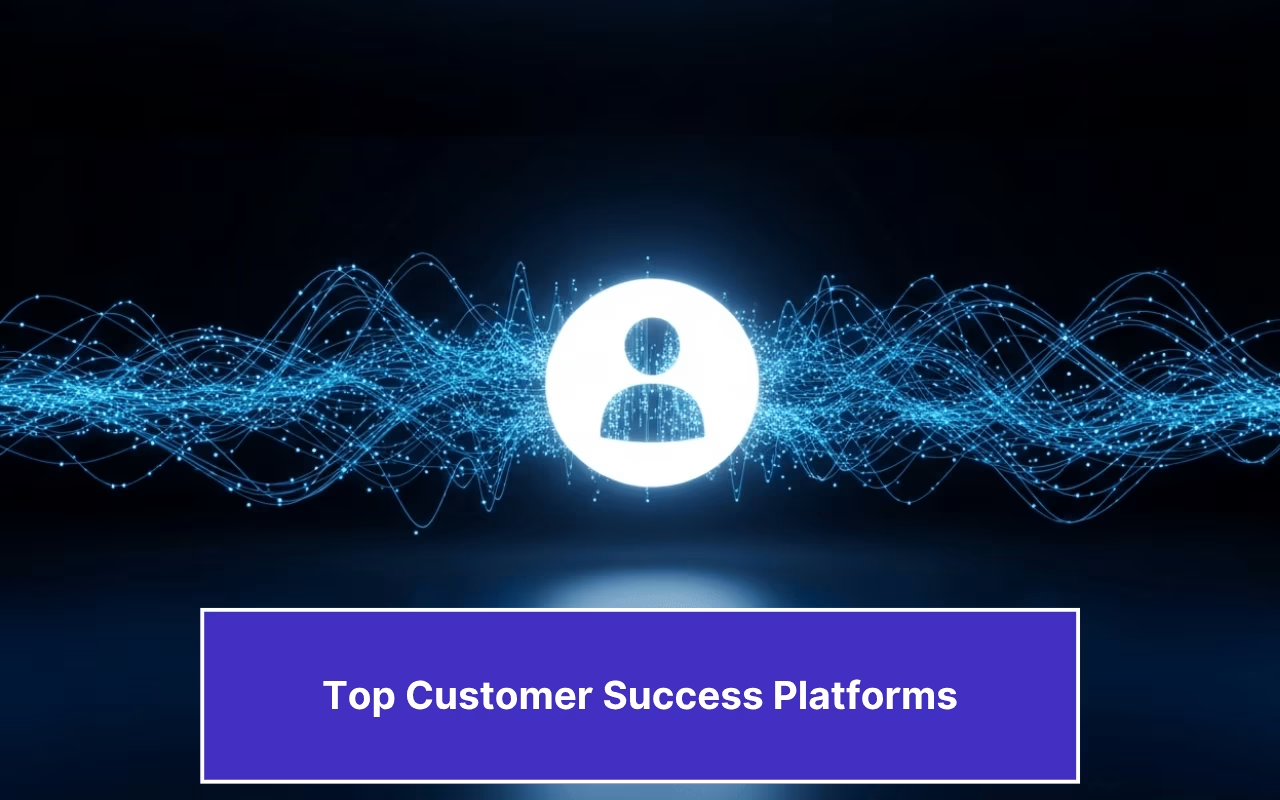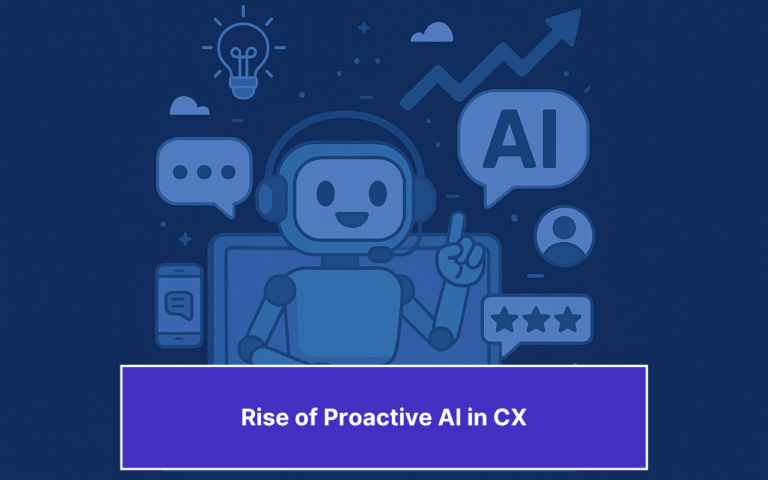Updated on January 21, 2025

Chatbots have been there for long, and so has the speculation that one day they will replace humans in the workplace.
Although chatbots are still looked at with contempt for many justifiable reasons, they have definitely come a long way from being the primitive version of themselves. The three-pronged spear – AI, NLP, and ML have made chatbots smarter and more contextual than before.
Various studies predict that the pace with which chatbots are improving, they might soon give humans a run for their money. For example, a study by Oxford University and Deloitte predict that 35% of current jobs in the UK are at high risk of computerization.
Customer Support is one such area, which many predicts is prime for disruption. But let’s not forget customer experience is currently the leading competitive differentiator. At least in a helpdesk context, it still relies heavily on our ability to understand people’s needs to be heard, respected and cared for and at the same time, it also requires fast problem solving and data-based decision making.
So can Chatbots and AI replace human support agents? Honestly, I don’t know, but from where I see man and machine are categorically different; humans are better decision makers, while computers are more efficient in processing data. So rather than one replacing the other, I believe the future is that of bot+human complementarity.
To get better clarity on this topic, we decided to go straight to the big guns and find out what they think about it. We sought opinions from 13 Chatbots and AI experts from around the globe and asked them the following question:
- Are chatbots a threat to 2.2. million support agent’s jobs?
- Why do you think they are or they aren’t a threat?
Below you will find the responses from each of these experts compiled for you:
1. Larry Kim (@larrykim) – Founder & CEO, https://mobilemonkey.com/ 
Right now, most chatbots are like “broken search engines”. The answers they provide are often like using “Ask Jeeves” or some other lousy search engine from a decade ago. So, I don’t think it’s a threat to customer support right now.
Chatbots can be used to answer very basic, frequently asked questions. Things like “what are your hours?” or “directions to your store?” or “refund policy?”. This kind of automation frees up time from support operators to focus on higher value support, which is currently near-impossible to automate well, using chatbots.
Suggested read: Build your custom chatbot within 15 minutes using our free codeless chatbot builder.
2. Alex Debecker (@alexdebecker) – Founder & CGO, https://www.ubisend.com/ 
We are big believers in AI and chatbots making humans better, faster, stronger, and not replacing them.
Most of the customer support solutions we have deployed have been to help humans. Before AI, an average of 40% of a support agent’s time is spent responding to the same questions, day-in-day-out.
Human+Bot hybrid support solution to put your customer support on autopilot
When we automate this 40%, these agents can utilize these hours to get back to the work they excel at, the more complex, human tasks that require empathy and all the great qualities they were hired for in the first place.
In a nutshell, by blending humans and AI it is possible to create something that is greater than the sum of its parts.
3. Dennis Mortensen (@DennisMortensen) – CEO & Founder, https://x.ai/ 
Today, we see chatbots that augment the work of support agents by pre-filtering customer queries. We use this type of technology with our own Customer Success team, and we’ve found it’s been hugely effective in helping them focus on the most complicated cases and deeper customer interactions.
Then there are intelligent agents; these are fully autonomous agents who take over low value, rote, repetitive tasks. Over the past two decades, as we’ve fully digitized the workplace, these tasks have devolved onto knowledge workers, stealing precious time from the jobs they were actually hired to do. Think of things like expense reporting, travel booking, and meeting scheduling. Here, we see the use of Intelligent agents as a democratizing force, giving far more busy professionals access to help that typically only the corporate elite can afford.
Check out demos of Kommunicate support bots – don’t miss out on our FAQ bot
4. Catriona Wallace (@catrionawallace) – CEO & Founder, https://flamingo.ai/ 
Although analysts predict that 40% of jobs like those of call center agents will be automated within the next 5 years, we don’t think this is what will happen. We believe bots will instead augment many jobs. We call these “HAVA workers – Human Assisted Virtual Assistants”, or “HAMA – Human Assisted Machine Assisted jobs” where chatbots support call center agents.
Humans will initially train the bot and later the bot will train the human. Together they should increase efficiency by 30% and improve the customer experience. Bots that do fully automate jobs will free the agents up to handle higher order tasks. This is what will likely happen.
See why bot+human hybrid support is the new era and a sustainable model
So the bots are not a threat rather are our partners, who would instead augment and amplify what support agents can do. The agents who work with our bots, ROSIE, RILEY and MAGGIE, do not want to go back to being just on the phones or web chat or email on their own. They love the support of the bots. This is consistent feedback from all our agents.
5. Maria Johnsen – Digital Marketing & AI Influencer, maria-johnsen.com
Many companies are using chatbots especially in India and the other Asian countries where more consumers need support and many of their questions are easy to be answered by a bot. Some of these questions are already answered in companies FAQ but 98% of people are too lazy to read them.
Here’s why you should delete your FAQ page and replace it with a chatbot instead
Telephone, Internet providers and banks are the biggest chatbots users.
Although using chatbots lower operational costs and also serve more customers at a time, but many companies came to realize that they still need human support agents to handle their customer needs.
No matter how intelligent chatbots are programmed, they are still dumb and primitive. This is why companies still need human support to take care of their customers’ inquiries.
People are more intelligent and tech-savvy today than they were 10 years ago. The more we get advanced in technology the savvier people will become in terms of using technological devices.
I personally prefer to speak to a human. I am a big fan of human to human interaction more than human to machine. No matter how advanced technology will become, there are matters that human customer support can handle better than a bot. In fact, chatbots are a supplement to human customer support. They won’t be a threat to people’s jobs.
A human agent knows how to talk to people and help them with their needs. A chatbot doesn’t understand, certain human emotion and behavior. Companies know it too. People ask so many tricky questions in order to understand they talk to a human or a bot.
Some just stop using a product if a machine answers to their questions. This is why I don’t think companies rely 100% on using bots only when it comes to customer service. Because customer service is the most important component of a business. It is the face of a company. A business owner won’t take this risk and replace a machine. So no chatbots are not a threat to support agent’s job.
6. Benjamin Merritt – Co-Founder & CEO, https://itsalive.io/
Chatbots will not replace humans.
Chatbots have proven to be very effective in many key brand objectives like augmenting the brand’s experience, lead generation, brand services and obviously customer care.
Companies leverage chatbots to improve customer relationship by providing instant services, things like automating replies to frequently asked questions.
Meanwhile, the key to delightful customer experiences is finding the right balance between man and machine.
Last year 330 Million people interacted with a brand via Facebook Messenger.
This number is proof that consumer preferences of contacting a business and seeking information are changing.
And brands, therefore, should be present where their audience is and be prepared for what is only the beginning.
I firmly believe chat will be the preferred mode for support and so chatbots and human agents can form a formidable partnership.
One in which chatbots handle the splurge of new demand with quick replies to simple questions so that human agents get time for questions that require human empathy and intelligence.
In response to this necessity, Facebook has introduced last year, the handover protocol that technically enables users to switch from a bot to a human customer management app easily.
So you can now have a bot and a human living within the same channel.
Are you considering chatbots for your business? Download the Complete Beginner’s Guide to Chatbots for a more detailed explanation on chatbots’ capabilities, industry use-cases and a step-by-step guide on how to build one.
7. Jay Hinman (@jayhinman) – VP of Marketing, https://www.digitalgenius.com/ 
Companies are beginning to resist the urge to take on a new chatbot project merely because of their hype, particularly in customer service. This is an area with incredibly high stakes for customer expectations, retention and competitive differentiation. Research has shown that 49% of customers do not want to be served by a chatbot at all and that a whopping 67% of customers still prefer to interact with a living, breathing, human agent, whether by phone, email or chat. The people have spoken and it is evident that while chatbots can be useful in limited instances, there are far better ways to serve customers.
The major drawback with chatbots is they are standalone interfaces, uncoupled from the centralized view of the customer, unaware of the customer’s purchase history and preferences. This means in a chatbot conversation, you’re asking the customer to re-introduce themselves every time, while valuable interaction data that should be automatically collected is lost. That just shouldn’t happen from business nor an experience point of view.
Chatbots also scale poorly across languages and channels. You may identify a provider with bona fides in English conversational NLP, but what happens when you expand to new markets and languages? What happens when your customers in those markets prefer to communicate over email, which renders the chatbot capabilities redundant? How will you cope with growing volumes with that standalone solution in place?
If the goal of launching a chatbot is to stand out or attract attention, publicity and new customers, that’s almost certainly not sufficient to qualify for a strategic customer play – one that serves to make your company’s customer service a competitive differentiator. It does, however, qualify as a gimmick.
8. Vassil Petev (@vassilpetev) – Co-Founder, https://smartloop.ai/
No, chatbots are not a threat today, and in my opinion, they won’t be for the next 4 to 5 years. In order for chatbots to replace support agents, chatbots need to be smart and powered by AI and NLP. Today’s NLP is quite advanced, but AI technology still lacks the required skills to assess support questions properly. To train an AI-powered chatbot to answer support-related questions, the AI engine needs to be programmed to figure out the context and intent of the question being asked while taking into account other valuable data points. The human brain can process these bits of information right away, whereas an AI engine needs to be programmed to do so. In other words, today an AI-powered chatbot can solve “simple” questions, but not more complicated ones.
Guide to integrating AI-powered chatbot built using Google’s Dialogflow in your website
Here is an example:
— Human to human —
Client: “My car won’t start.”
Dealer: “It was extremely cold outside this morning. Probably you had a low amount of fuel and it froze.”
Client: “Wow. This is true. How can I solve this?”
Dealer: “(dealer explains the solution)”
— Human to chatbot —
Client: “My car won’t start.”
Chatbot: “There could be several reasons for that. Please, tell me the make and model of your car and I will troubleshoot the problem for you.”
Client: “Well, my car was OK yesterday.”
Chatbot: “Interesting. I will still need the make and model of your car in order to troubleshoot the problem.”
Back to the AI problem:
Once AI engineers figure out how to connect all the data points to make context work and to make chatbots smart, probably part of the support workforce will lose their jobs. I cannot predict how much, but looking at similar historical events, probably some 25% of these people will need to rethink their future at some initial point. The good part is that they will not lose their jobs right away and they will have time to refocus their knowledge. At that point in time, AI will need support personnel as well, so some of these people will go in the AI/NLP market. In the long run probably after 10 years, and after everything has been automated, probably some 75% of support people will be working in different positions.
9. Mark Stephens (@meadovian) – Co-Founder & CEO, https://botanic.io/
Many different studies (Gartner, HBR, etc) have shown that roughly 47% of jobs in industrialized countries will be displaced by “AI” in the coming five years. Support, CRM, and basic remote assistance is going to be summarily displaced. Already some 40% of the tasks in these highly pre-scripted interactions are replicable by simple chatbots, let alone voice assistants and video-bots, such as we have built at Botanic.io for Skype and other customers.
Is this a threat or an opportunity?
What computers and calculators help us achieve in minutes, were once desk jobs – and they were boring ones, at that.
Same can be said of CRM and support jobs of today. In fact, some countries have a sizeable portion of their GDP from these CRM jobs.
If someone working in a CRM or support job looks at it in the right way then bots are a way for them to automate their own work. Would they be able? Would their employer allow that? Well, if I could get a robot to assist me in my job – and be paid for the whole of it – I wouldn’t be apprehensive about them. And I believe most people are of the same mindset.
But how can they get paid, and who gets paid? Who has the knowledge, tools, and infrastructure in place?
Other than Amazon, not many. And even skilled developers are not properly compensated, let alone some poor, uneducated father reading from a branching-tree of replies at a CRM desk!
Technology and compensation for knowledge must be open, like the web, otherwise it *will* be a threat. And building good bots is hard.
We have thought about this issue for many years. We think we’ve solved this with a spin-off of Botanic Technologies.
10. Arnav Patel (@sir_patel) – Director of Growth, https://hellotars.com/ 
It can’t be denied that chatbots do threaten customer support jobs. Having worked in the industry for 3 years, we have found that at least 50% of incoming support queries are repetitive/basic queries which do not require a human agent’s involvement. Chatbots (even without any AI involved) can easily handle these queries, thus reducing query volume, which will, in turn, reduce the demand for human agents.
It is worth noting though that I don’t think chatbots will completely replace customer support agents. The state of AI as it is today means that bots aren’t quite ready to handle every single user query that is sent to them. Humans will still need to handle these queries in the foreseeable future. Additionally, in organizations where customer support teams are overburdened (local government agencies are a good example), chatbots won’t replace humans but rather supplement them by filling in a resource gap.
11. Vladimir Getselevich – AI, NLP Expert & Co-Founder/CTO, http://robinlabs.com/
I think the goal to make answering user support question automatic using programs (chatbots) is good. But at the current state of conversational AI, there is no possibility to make this program intelligent enough to really understand and answer sophisticated user questions. It can only be programmed to answer trivial and frequently asked questions, therefore I do not think that in the near future support agents can be altogether replaced by bots.
12. Richard McGrath – Founder, https://conversionbuzz.com/
From what I’ve seen, I don’t think we’re at a point yet where chatbots are a serious threat to support agent’s jobs. Chatbots are only smart enough to handle basic queries well, but human support agents are needed for more complex questions. But chatbot and AI technology are quickly evolving so I’d predict it won’t be long until they are a genuine threat to jobs.
13. Petr Marek (@thePetrMarek) – Second place winner of Amazon Alexa Prize ’17
No, I believe it to be quite the opposite. Chatbots would instead help support agents to ease and speed up their work. For example, chatbots can provide the support agent with probable answers to choose from or suggest the next immediate action to take. The reason why chatbots can’t work alone is that the technology is not there yet to handle the most complicated but quite common user messages.
Well after around 3000 words the debate still lingers on – whether chatbots will rob us of our jobs or not? But one thing is pretty clear they will definitely make our lives easy and whatever jobs they rob us of (if at all they do) they will compensate by opening up new opportunities.
In the long run, chatbots might be what sci-fi movies have made us believe they can be, but for now, they can be the assistant that your support agents need to make their jobs easy to answer customer questions faster and give you a competitive edge.
What is your take on – Are chatbots a threat to 2.2 million support agent’s jobs? Why or why not?
Tell us in the comments section below.





